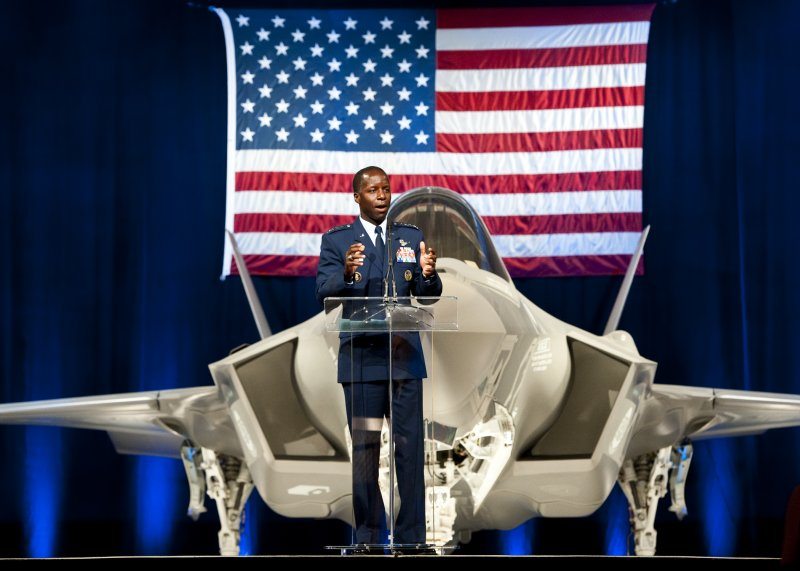EGLIN AIR FORCE BASE: Air Force officials said the unveiling of the F-35A Lightning II joint strike fighter was a “historic occasion” during a rollout ceremony here Aug. 26.
The F-35A, on display during the ceremony, was delivered here in July by Lt. Col. Eric Smith, the Air Force’s first F-35 pilot.
“This is indeed a new era,” said Gen. Edward A. Rice Jr., the Air Education and Training Command commander and host of the milestone event.
The aircraft was developed in a span of only 15 years, one-eighth of the 118 total years powered flight has existed, he said. The F-35 brings advanced technological capabilities for the future and the nation’s defense — something the general explained was clearly unimaginable when Orville and Wilbur Wright performed their maiden flight Dec.17, 1903, at Kitty Hawk, N.C.
“While this celebration is taking place in the Air Force hangar with the Air Force variant of the F-35, this is really a story about the fully integrated team of Soldiers, Sailors, Airmen, Marines, industry and community partners who have been working years to make this day possible,” said Col. Andrew Toth, the 33rd Fighter Wing commander. “In fact, Marine Col. Art Tomassetti, my vice, (today’s master of ceremonies), and test pilot, has been with this program for more than a decade. So, some of us have been waiting a long time to see this day.”
During the past two years, the integrated and multi-service team “Nomads” transformed their corner of Eglin AFB into the Department of Defense’s F-35 Integrated Training Center. The center includes a university setting in which maintainers are expected to live, work and train alongside pilots in operating the fifth-generation stealth fighter.
More than 400 guests watched the JSF unveiling inside a newly constructed Air Force hangar, a place where a future generation of F-35 maintainers, pilots and leaders will learn their craft.
“Eventually about 2,200 maintainers and 100 pilots a year will pass through our schoolhouse doors,” Toth said. “In 2014, the program should mature enough to have the Air Force send students fresh from basic training.”
Delivery and success of the new program required the Air Force overcome a great number of challenges. It will continue to do so until the F-35 capabilities reach their full potential for the interest of national security, Rice said.
“But with all the wonders of technology and the amazing physical performance of the F-35, let me say that none of this happens without magnificent people,” he said.
Wing leadership said they’re already reaping the benefits of multi-service collaboration in co-located facilities.
“What this aircraft behind me is a visual representation of our exciting future,” Toth said. “The 33rd Pursuit Group of the past is nothing like the 33rd FW of today, except in the longstanding spirit of air power. With the F-35 program, we foresee air dominance for our services and partner nations for the next 30 to 50 years.”










